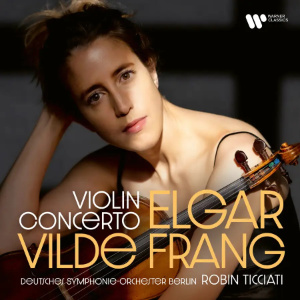
Sir Edward Elgar (1857-1934)
Violin Concerto in B minor, Op.61 (1910)
Carissima (1913)
Vilde Frang (violin)
Thomas Hoppe (piano)
Deutsches Symphonie-Orchester Berlin/Robin Ticciati
rec. 2023/24, Jesus-Christus-Kirche, Berlin (concerto); Teldex Studio, Berlin (Carissima)
Warner Classics 2173240942 [52]
Vilde Frang has had the Elgar in her repertoire for a number of years and is currently performing it with Antonio Pappano and the LSO, having toured it with the CBSO and Mirga Gražinytė-Tyla. It’s not a concerto that lacks adherents these days as Michael Barenboim (Linn) and Nicola Benedetti (Decca) would agree and so would Alda Dizdari (Mellos) and Thomas Albertus Irnberger (Gramola), all of whom have recorded it in the last few years. Now Frang, whose international profile most approximates Benedetti’s in lustre, adds her own version.
She has been teamed with the Deutsches Symphonie-Orchester Berlin under their music director Robin Ticciati for a very forthright, intense reading that is at its most comfortable in the slow movement and at its most erratic in the outer ones. However one plays the concerto, all three movements must have a sense of cohesive logic. The problem starts with Frang’s first entry, which finishes the orchestra’s introductory paragraph, and is far too heavily vibrated for my tastes. She caresses themes lingeringly but makes sure to invest her line with a quivering, nervous tension, slashing phrase endings brusquely in the interests of fiery declamation. I found Benedetti’s vibrato problematic too, though she isn’t as extreme as Frang in her passagework which sounds hustled and abrupt. There is a great deal of texture and varieties of colour in Frang’s playing but it’s not always narratively coherent. Strangely, she lacks heft and dynamism at the end of the movement which made me wonder how big her tone is in a concert hall.
The slow movement is the least problematic in terms of technique and emotional temperature and though I still feel some overemphasis in her playing, it’s a moment of expressive repose to which she responds pretty well, and so does the orchestra, which plays soundly throughout. I liked the accompanying running string figures in the finale and there are insouciant wind lines that one seldom hears, either on disc or in concert, but exciting though Frang can be, I found her playing lacking in focus, and transitions are strangely effortful – strangely because she has clearly played the concerto often. There’s a deal of skittishness and tension isn’t generated cumulatively. Instead, it lurches. The accompanied cadenza is notable for dynamic extremes – she really does play on the verge of inaudibility sometimes – and the final peroration is nobly conceived but I wasn’t convinced that Frang and Ticciati had made a strong enough case for the music, rather that its narrative was fractured and unconvincing. At 49 minutes it’s pretty much par for the course these days though I prefer the 43 established by Albert Sammons, or Alfredo Campoli’s 45.
Frang adds Carissima with pianist Thomas Hoppe as an encore. It’s very sweetly done but I think they should have stuck to their guns and just presented the Concerto or added something substantial – after all, Philippe Graffin and Vernon Handley added Chausson’s Poème, James Ehnes and Andrew Davis found room for the Serenade for Strings, and Tasmin Little and the same conductor included Polonia and other things.
The recording of the concerto took place in the Jesus-Christus-Kirche, Berlin and is fine. No complaints. However, the performance doesn’t convince me and I’ll be waiting for a recording by Frank Peter Zimmermann, who is as old as I am, so he’d better get a move on.
Jonathan Woolf
Buying this recording via a link below generates revenue for MWI, which helps the site remain free



















